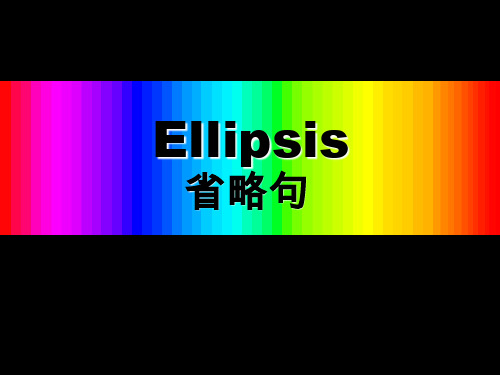高中英语语法省略句课件上课讲义
高中英语语法省略句 专题复习课件(共32张PPT)

The train is going (at) fifty miles an hour.
This is the most exciting game (that) I have ever watched.
•9、要学生做的事,教职员躬亲共做;要学生学的知识,教职员躬亲共学;要学生守的规则,教职员躬亲共守。2021/9/62021/9/6Monday, September 06, 2021 •10、阅读一切好书如同和过去最杰出的人谈话。2021/9/62021/9/62021/9/69/6/2021 7:52:57 AM •11、只有让学生不把全部时间都用在学习上,而留下许多自由支配的时间,他才能顺利地学习……(这)是教育过程的逻辑。2021/9/62021/9/62021/9/6Sep-216-Sep-21 •12、要记住,你不仅是教课的教师,也是学生的教育者,生活的导师和道德的引路人。2021/9/62021/9/62021/9/6Monday, September 06, 2021
Answer: A
I will是I will get up earlier tomorrow morning的省略说法。
5. —What’s the matter with you?
—I didn’t pass the test, but I
still_______.
A.hope so
B.hope to
13、He who seize the right moment, is the right man.谁把握机遇,谁就心想事成。2021/9/62021/9/62021/9/62021/9/69/6/2021 •14、谁要是自己还没有发展培养和教育好,他就不能发展培养和教育别人。2021年9月6日星期一2021/9/62021/9/62021/9/6 •15、一年之计,莫如树谷;十年之计,莫如树木;终身之计,莫如树人。2021年9月2021/9/62021/9/62021/9/69/6/2021 •16、教学的目的是培养学生自己学习,自己研究,用自己的头脑来想,用自己的眼睛看,用自己的手来做这种精神。2021/9/62021/9/6September 6, 2021 •17、儿童是中心,教育的措施便围绕他们而组织起来。2021/9/62021/9/62021/9/62021/9/6
高中英语语法——省略句(26张PPT)

please.
的一部分)
A: Would you like to
come to the party? B: I’d love to (come the
party).
不定式后 省略动词
They do not visit their parents
as much as they ought to (visit
பைடு நூலகம்
— Well, her parents wouldn’t allow
her to go to the party, but she
still _____.
A. hopes to
B. hopes so
C. hopes not
D. hopes for
(江苏2017)
4. — Have you got any particular
You can borrow my first aid notes if you want to (borrow my first aid notes).
不定式后省略动词
7) Sounds like a good idea. (It) sounds like a good idea.
8) Anything I can do for you? (Is there) anything I can do for you?
5. Sorry to hear that. I’m sorry to hear that.
6. Pity you couldn’t come.
It’s/ What a pity you couldn’t come. 7. This way, please.
Step this way, please.
高中英语语法——省略(53张PPT)

Where did the singer get the information that singers were needed for Turandot? From a poster put up by the production company’s Personnel Department. Why did the singer think it was difficult to try out? He/She had a sore throat.
(especially of rules or laws) to have a connection or be important: 适用
That bit of the form is for UK citizens—it doesn’t apply to you. Those were old regulations—they don’t apply any more. to spread or rub a substance such as cream or paint on a surface: 涂抹 Apply the suntan cream liberally to exposed areas every three hours and after swimming. The paint should be applied thinly and evenly.
Signs
No smoking is allowed here.
This is a one-way street.
Instructions
Put this side up, please.
Please handle this with care.
英语省略句讲解ppt课件

What they want to do is (that) they go to play basketball.
2、不定式符号to的省略
①、并列的不定式可省去后面的to。 e.g. I told him to sit down and wait for a moment.
9、情态动词should的省略
insist, order, command, suggest, propose, advise, demand, require, request, ask. It’s necessary/important/impossible/strange/ natural/a pity…
2、Omitting the Predicative(表语)
(1)–Is he a teacher ? --Yes, he is (a teacher ).
(2) His sister isn’t lazy, nor is his brother (lazy).
3. Omitting the Object(宾语)
10、同时省略几个成分。
e.g. Let’s meet at the same place as (we met) yesterday. ---- Have you finished your work? ---- (I have) Not (finished my work) yet.
(二)并列句中的省略
1、主句中有一些成分被省略。
e.g. (I’m) Sorry to hear that you are ill. (It is a) Pity that he missed such a good chance.
2、省略了一个从句或从句的一部分,用so或not (切不可用it或that)代替。
高考英语语一轮复习——省略课件(共26张PPT)

III. 介词的省略 1)在以next, last, this, that, these,
those, one, every, each, some, any, all等开始的一些表示时间的常 用词组前面以及tomorrow morning, yesterday afternoon前面,不用介 词: 1. See you next Saturday. 2. I’ll never forget meeting you that afternoon. 3. We met one Tuesday in August. 4. Come any day you like. 5. The party lasted all night.
• I will ask them to come over and talk the matter over.
3)在某些动词后可省略整个动词不定 式。这种情况常出现在名词和形容词 以及try后:
1. ---Can you start the car?
---Ok, I will try.
2. You can’t force him to get a job if he is not ready (to).
years ago. 4. What size shoes are you?
6)在 in this way, in the same way, in another way等词组里,经常省略in:
1. They plant corn (in) the same way their ancestors used to 500 years ago.
that 不能省略: 1. She has made it clear that she will
英语省略句课件

句子中名词性从句省略的 例句
I think he is happy, but I don't know.(我认为他很开心 ,但我不知道。)
句子中状语从句省略的例句
If you're going to the party, so am I.(如果你去参加聚会, 我也去。)
英语省略句的注意事项
省略引起的歧义 注意省略的合理性和得当性
英语省略句课件
欢迎来到英语省略句课件!在这个课件中,我们将探讨英语省略句的定义、 规则、示例以及注意事项,帮助您提高对英语省略句的理解和应用。
什么是英语省略句
英语省略句的定义
省略句是指在句子中省略一些成分,但能保证意思表达清楚,是英语中常见的语法现象。
省略句的分类
英语省略句可分为主语省略、动词省略、宾语省略、名词性从句的省略以及状语从句的省略。
提高英语省略句的使用技 巧
通过大量阅读和实践,加强对 省略句的灵活运用和准确理解。
英语省略句的示例
句子中主语省略的例句
Going to the bookstore.(去 书店)
句子中动词省略的例句
She wants to play the guitar and I do too.(她想弹吉他, 我也想。)
句子中宾语省略的例句
I like coffee, and she does too.(我喜欢咖啡,她也喜欢 。)
英语省略句的规则
主语省略
当主语在上下文中明 确时,可以将其省略, 让句子更简练。
动词省略
在情景语境中,当动 词可以根据句子的时 态和语态进行推测时, 可以省略该动词。
宾语省略
当句子主语和动词明 确时,宾语可以省略, 避免重复。
英语高考省略句PPT课件

5、主句和从句各有一些成分省略。
The sooner (you do it), the better (it will be).
第12页/共28页
Choose the best answers.
1)----Tomorrow is a holiday. Why are you doing your homework? -----I am doing these exercises now so that I won’t have _____ on Sunday. A. it B. them C. for D. to
第17页/共28页
高考链接
1. The house rent is expensive, I’ve got about half the space I had at home but I’m paying _____ here.
A. as three times much
D B. as much three times
省略句
▼基本概念 省略句的定义:
省略句是为了避免重复、突出新信息并使上下文紧密连接的一种语法 修辞手段。省略在语言中,尤其在对话中,是一种十分普遍的现象。
第1页/共28页
简单句的省略 1、省略主语 祈使句中主语通常省略;其它省略主语
多限于少数现成的说法。
高考英语语法之省略知识精讲讲义

二十五、省略知识精讲为了避免重复,或为了使句子更简练,在一些句子中常常省去某些成分,这在英语中叫做省略。
一、在and连接的句子中,为避免重复常省略相同的部分(主语等)She set out soon after dark and arrived home an hour later.二、状语从句中的省略1.在while, when, whenever, till, as soon as, if, unless, as if,as, whether 等引导的状语从句中,若谓语动词有be,而主语又与主句的主语相同或主语是it时,常省略从句的主语和be,成为“连词+非谓语动词/形容词”形式作状语。
Errors, if (there are) any, should be corrected.如果有错误,就应该改正2.在as,than,however, whatever, no matter what等引导的从句中常省略某些成分the speaks English better than anyone else(speaks)in the class.她英语讲得比班上其他人3.虚拟语气条件句中常省略if将were.should,had提到主语前构成倒装语序三、定语从句中的省略.1.在限制性定语从句中,作宾语用的that,which,whom 可省略,在the same...as 和such.. as 引出的某些定语从句中可省略与主句相同的部分I don't like such a book as this (is).我不喜欢这样的一本书.定语从句中、“关系代词作主语+系动词be”可以省略,成为现在分词短语(表主动)或过去分词短语(表被动)作后置定语The goods (which were) ordered last month haven't arrived yet. 上个月订购的货物还未到I know the boy (who is) sleeping there.四、名词性从句的省略在know,think, consider, suppose, find, believe, say, decide 等动词后面接的宾语从句中,连词that可省略,若带有多个宾语从句,只能省第一个that,其余的不能省。
- 1、下载文档前请自行甄别文档内容的完整性,平台不提供额外的编辑、内容补充、找答案等附加服务。
- 2、"仅部分预览"的文档,不可在线预览部分如存在完整性等问题,可反馈申请退款(可完整预览的文档不适用该条件!)。
- 3、如文档侵犯您的权益,请联系客服反馈,我们会尽快为您处理(人工客服工作时间:9:00-18:30)。
5.在than或as引导的从句中的省略。 Many others are doing better than we are. 6.省略一个从句或从句的一部分,可用so 或 not代替。常用 于此类的动词有believe , think, expect, guess, hope, imagine, suppose, say, tell以及appear, seem, afraid等。 —Is he coming back tonight? 在部分虚拟条件句中可省略,但后面的语序有变 化。
Had they time, they would certainly come and help us.
8.不定式符号to的省略。 (1)并列的不定式可省去后面的 to。
I told him to sit down and wait for a moment. (2) 某些使役动词(let, make, have)及感官动词(see, watch, hear, notice, observe等)后面作宾语补足语的不定 式一定要省去 to, 但在被动语态中须将to 复原。
—Yes, I’d like to (go there). 注意:在下列词后常省略不定式但要保留to: want, wish, like, hate, hope, intend, plan, love, refuse, expect,但当 want 和like用于从句中时,to常常省略。
5.结构省略 可以根据通常的语法结构加以判断,比如省略表语或同时 省略几个成分。但在否定句中不能省略。 We have lived here (for) ten years. I haven’t seen you for three months.
省略
省略
定义
为了避免重复,突出关键词语,并使上下文紧密连接, 在句子中有时就省去了一个或几个句子成分。这种语法手 段就称为省略。省略是重要的修辞原则,因此,只要不损 害语法结构,不产生歧义,能省略的就应省略。
简单句中的省略
1.省略主语 祈使句中主语通常省略;其他省略主语多限于少数现成的 说法。 (1) (I) Thank you for your help. (2) (It) Doesn’t matter. 2.省略主谓或主谓语的一部分 What/How (do you think) about a cup of tea ?
并列句中的省略
1.在后一并列分句中凡是与上下文相同的成分通常都要省略。 My office was on the tenth floor, and his (office was) on the twelfth (floor). 并列句的省略有时还可出现在前面的分句中,这时被省略 的词语便出现在下文。
3.复合句中的省略现象多出现在状语从句中,在某些状语从 句中,从句的主语与主句的主语一致时或主语是it时,可省 去“主语+be”部分。 Although hard-working, he couldn’t earn enough even to support him. 4.引导宾语从句的从属连词只要从句不长,that通常都可省 略。但如果从句较长或从句的语境较复杂, 连词that 不能省 略。 1)I hope (that) all will go well. 2)She has made it clear that she will have nothing to do with him.
I saw the boy fall from the tree.
(3)介词but前若有动词do,后面的不定式不带 to。 The boy did nothing but play. (4)主语从句中有动词do,后面作表语的不定式的 to可带可 不带。 All we can do now is (to) wait.
【高考链接】
1. (2014·福建高考)The climate here is quite pleasant,the temperature rarely,_______ ,reaching 30℃in summer.
A.if not
B.if ever C.if any
3.在对话或并列句中,如果主语、谓语不同,而宾语相同, 则常省去相同的宾语部分。
Tom enjoys dancing, but Peter hates (dancing).
4.省略作宾语的不定式短语,只保留to,但如果该宾语是 动词be或完成时态,则须在之后加上be或have。
—Are you going there?
复合句中的省略
1.复合句中的省略现象常见于从句中,主句中的省略通常出 现在句首。 Hope you will have a good journey. 2.有时整个主句都可省略, 这种省略通常出现在简短答语 中。 —Are you going to buy the house? —Unless my wife objects.
George will (take the course) and Bob might take the course.
2.省略动词 + 宾语或补语 I will buy a house. He will (buy a house) too. 3.省略主语 + 谓语动词 We still have shortcomings, and (we have) very big ones, too. 注意:出现在并列句中的be, have, do,如果在一个分句中作 助动词,而在另一个分句中作行为动词,不可省略。 4.省略主语 + 谓语 + 宾语 They tried to prevent the pollution, but (they did) not (prevent the pollution) very successfully at the beginning.
